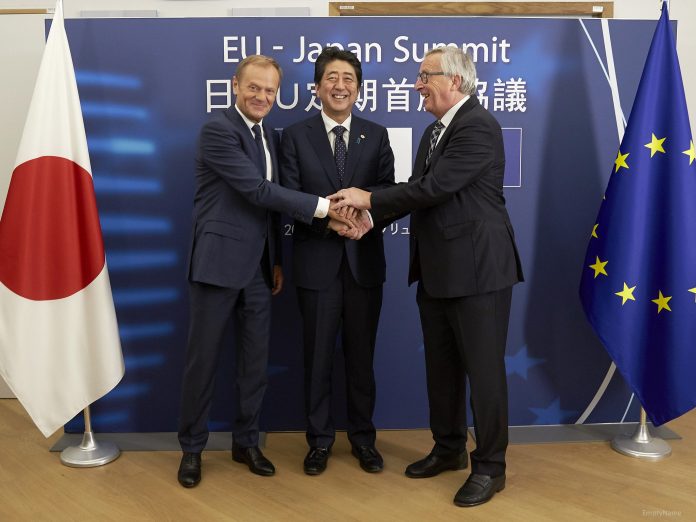One of the world’s largest trading blocks is just a few signatures away from realisation. The European Union and Japan will sign this unprecedented free trade agreement on July 17.
The EU said the deal sends “a message” about “shaping globalisation.”
As reported by Deutsche Welle (DW), Germany’s international broadcaster, the trade deal that the EU and Japan are preparing to sign would eliminate 99% of tariffs, which cost businesses in the EU and Japan nearly €1 billion ($1.17 billion) annually.
According to the European Commission, the EU-Japan deal is the largest ever negotiated by the EU and will create a trade zone covering 600 million people and nearly a third of global GDP.
Japanese Prime Minister Shinzo Abe will meet with European Commission President Jean-Claude Juncker and European Council President Donald Tusk in Tokyo to sign the EPA at the 25th EU-Japan Summit
“The free trade agreement will infuse a new dynamic for business relations on both sides,” said Marcus Schürmann, director of the German Chamber of Commerce in Japan (AHK Japan).
Meanwhile, the EU and Japan also see the signing of the deal as a signal against US President Donald Trump‘s protectionist trade policies. PM Abe views free trade as a driver of Japanese economic growth.
In a separate report, Euronews noted that Kazuo Kodama, Japan’s ambassador to the EU, joined business representatives at a seminar in Brussels to spread the word about the new deal.
“This will create a huge, free-trade zone, which comprises 640 million people of EU and Japan. And also the combined GDP total will amount to one-third of the global GDP,” said the ambassador. “So this will be a great opportunity for enhancing the welfare of the people in Europe and Japan.”
From biotech to cars, from wine to cheese, all sorts of industries are in line to reap rewards from the new trade freedoms.
When the deal comes into force next year and customs duties are removed, experts say consumers can expect more choice, at lower prices.
However, the European Green Party’s co-chairs Reinhard Bütikofer and Monica Frassoni issued a joint statement warning that the discussion of the merits and shortcomings of the agreement is only now beginning.
“We strongly criticise that the Commission did not provide the level of transparency that the public fought for so energetically in the discussions around TTIP and CETA,” they said.
“There are strong reasons to develop reliable, multilateral and fair trade relations. This is even more so the case as we experience unfair trade policies from so many corners. In particular from the US, but also from China and others.”
While it is “positively” noted that the trade agreement explicitly puts EU-Japanese trade into the context of the Paris climate goals, the Greens said it would have been better if the whole agreement was explicitly subjected to the ambition of helping to implement global sustainable development goals.
Also, they are “alarmed” by arguments from citizens and industry that the draft trade agreement does not offer the stringent protections against water privatisation.

